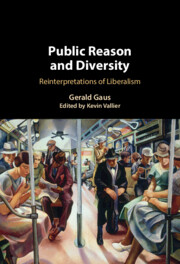Book contents
- Public Reason and Diversity
- Public Reason and Diversity
- Copyright page
- Contents
- Figures
- Tables
- A Note on the Essays
- Introduction
- Part I Liberalism
- Chapter 1 Reasonable Pluralism and the Domain of the Political
- Chapter 2 On Justifying the Moral Rights of the Moderns
- Chapter 3 Recognized Rights as Devices of Public Reason
- Chapter 4 The Moral Foundations of Liberal Neutrality
- Chapter 5 Coercion, Ownership, and the Redistributive State
- Part II Diverse Public Reason
- Index
Chapter 5 - Coercion, Ownership, and the Redistributive State
Justificatory Liberalism’s Classical Tilt*
from Part I - Liberalism
Published online by Cambridge University Press: 18 October 2022
- Public Reason and Diversity
- Public Reason and Diversity
- Copyright page
- Contents
- Figures
- Tables
- A Note on the Essays
- Introduction
- Part I Liberalism
- Chapter 1 Reasonable Pluralism and the Domain of the Political
- Chapter 2 On Justifying the Moral Rights of the Moderns
- Chapter 3 Recognized Rights as Devices of Public Reason
- Chapter 4 The Moral Foundations of Liberal Neutrality
- Chapter 5 Coercion, Ownership, and the Redistributive State
- Part II Diverse Public Reason
- Index
Summary
In the last few decades, a new conception of liberalism has arisen – “justificatory liberalism” – which developed out of the social contract tradition. The social contract theories of Thomas Hobbes, John Locke, and Jean-Jacques Rousseau all stressed that the justification of the state depended on showing that everyone would, in some way, consent to it. By relying on consent, social contract theory seemed to suppose a voluntarist conception of political justice and obligation: what is just depends on what people choose to agree to – what they will. As David Hume famously pointed out, such accounts seem to imply that, ultimately, political justice derives from promissory obligations, which the social contract theory leaves unexplained. Only in the political philosophy of Immanuel Kant, I think, does it become clear that consent is not fundamental to a social contract view: we have a duty to agree to act according to the “idea” of an “original contract” to which all agree. John Rawls’s revival of social contract theory in A Theory of Justice did not base obligations on consent, though the apparatus of an “original agreement” of sorts persisted. The aim of his famous “original position,” Rawls announced, was to settle “the question of justification … by working out a problem of deliberation.” As the question of justification takes center stage (we might say: as contractualist liberalism becomes justificatory liberalism), it becomes clear that posing the problem of justification in terms of a deliberative problem or a bargaining problem is a heuristic: the real issue is “the problem of justification” – what principles can be justified to all rational and reflective persons seeking to live under impartial principles of justice.
- Type
- Chapter
- Information
- Public Reason and DiversityReinterpretations of Liberalism, pp. 128 - 176Publisher: Cambridge University PressPrint publication year: 2022



